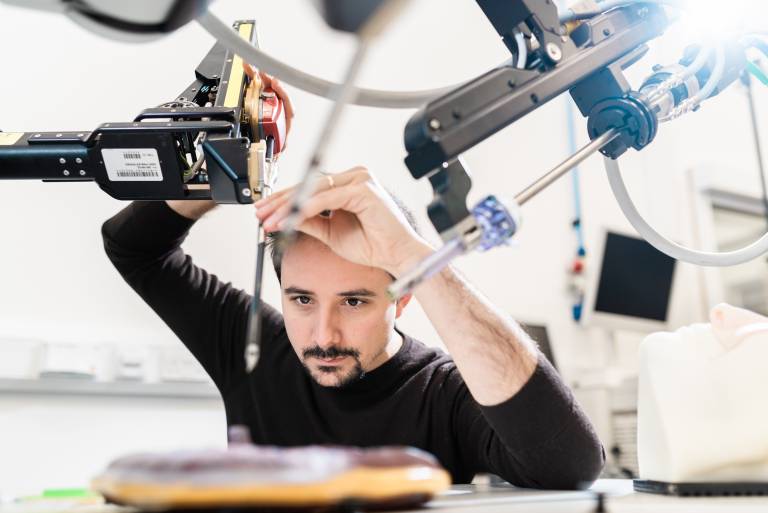WEISS Team Develop ISO-9001 Certified Quality Management System
3 November 2021
We’re delighted to announce that Professor Dean Barratt and Sarina Hussain have achieved the international standard of ISO-9001 for the WEISS quality management system.

The original medical software quality management system (QMS) was set up by Professor Dean Barratt in 2012 to accelerate the clinical translation and commercialisation of advanced image analysis techniques by providing a formal framework for the design and development of regulatory-compliant software and software-based medical devices as part of translational research projects. Since then, the QMS has been certified by BSI over a number of years and has continued to evolve. Since the launch of the UCL WEISS Centre, the QMS has formed a core strategic objective and resource for the Centre, with the Centre providing funding to support a full-time quality manager (Sarina Hussain) and access to an experienced external quality consultant (Sam Shelley of SQMS Ltd).
The QMS currently supports five projects and one spin-out company:
- K-Plan (Project Leader: Professor Brad Treeby) - K-Plan is a software platform for planning therapeutic ultrasound treatments in the brain.
- SmartLiver (Project Leader: Dr. Matt Clarkson) - SmartLiver is a system that guides surgeons during laparoscopic liver resection. Software enables a 3D model of patients anatomy and disease, derived from pre-operative CT scans, to be overlaid onto video images obtained using a camera inserted into the abdomen.
- QNICE (Project Leader: Dr. John Thornton) - QNICE is software to control the automated analysis of 3D MRI scan data to support clinical neuroradiology reporting. QNICE will run and manage analysis tools that have been developed in accordance with the Quantitative Neuroradiology Initiative framework.
- HYLODE (Project Leader: Dr. Steve Harris) - HYLODE is an advanced real-time hospital bed forecasting software tool that manages flow on NHS wards.
- Eye2Gene (Project Leader: Dr. Nikolas Pontikos) - Eye2Gene a web-based tool for predicting inherited retinal disease using machine learning.
- Phenopolis Ltd - Phenopois is a London-based health-tech spin-out that develops bioinformatics and healthcare software solutions to support medical research world-wide.
The QMS was also used to support the development of SmartTarget – medical image fusion software for guiding prostate needle biopsy and minimally-invasive prostate cancer treatment – through to CE marking and FDA clearance via a UCL spin-out. To date, the SmartTarget technology has been used in over 1,200 patient procedures and is now the basis of the Focalyx Fusion system marketed by US-based company, Intuitive Fusion LLC.
Following consultation with researchers and WEISS Senior Management, a decision was made recently to transition the QMS from ISO 13485 to ISO 9001 certification. ISO 9001 is an internationally recognised standard which is more appropriate for supporting a broader scope of activities since UCL does not place medical devices on the market in the same way commercial organisations do. Complying with this standard enables the provision of a resource that is better suited to supporting a wide range of relatively early-stage research projects engaged in the development of hardware- and software-based medical devices, as well as the development of healthcare software that must comply with the NHS Digital Health IT Systems standards to be used in clinical environments.
On 25th October 2021, the new ISO 9001 QMS passed the stage two audit by the BSi, meaning that the QMS is now fully certified as compliant with this standard. The updated QMS provides a comprehensive framework to support a wide range of projects, and is linked with several wider quality related initiatives within UCL as a whole. For example, Sarina and Dean have helped to develop and implement a proportionate QMS framework for UCL academics in conjunction with the UCL/UCLH Joint Research Office (JRO) and the UCL Translational Research Office (TRO). The aim of this resource is to improve knowledge of regulatory requirements and support innovation and successful translation of medical devices from concept through to commercialization. Dean and Sarina also sit on several committees dedicated to promoting medical device development and regulatory matters at UCL, and both Sarina and Dean have recently become members of the UK Medicines and Healthcare products Regulatory Agency (MHRA) Artificial Intelligence, Software and Apps Expert Advisory Group.
 Close
Close

